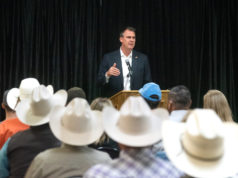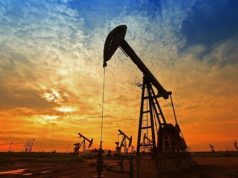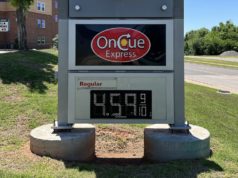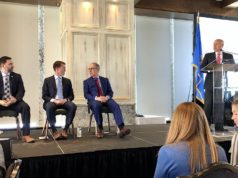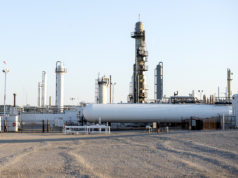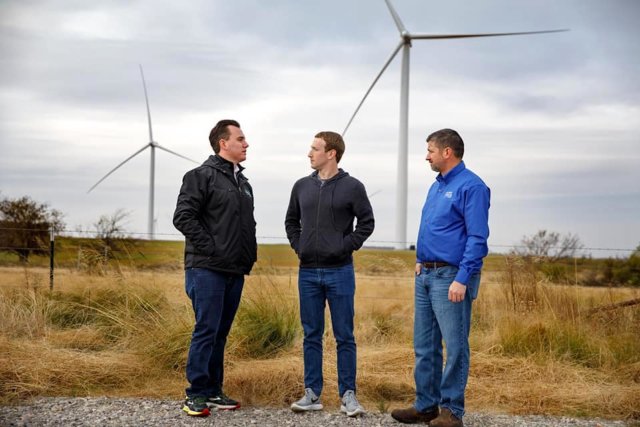

As legislators debated whether to raise the state’s oil and gas gross production tax Wednesday afternoon, Facebook CEO Mark Zuckerberg was writing about his visit to a southwest Oklahoma wind farm.
Zuckerberg’s 388-word Facebook post compared the wind and petroleum industries, coincidentally thrusting the New York billionaire into an Oklahoma political battle between competing — yet complementary — energy sectors.
To conclude his Year of Travel challenge, Zuckerberg visited NextEra Energy Resources, which owns wind farms near Minco and identifies as North America’s “largest wind generator.”
Zuckerberg juxtaposed wind jobs with oil and gas jobs in a manner fit to rub petroleum stakeholders the wrong way:
For the workers I met, they said working in wind energy is a more sustainable lifestyle than oil and gas. Oil prices are volatile, and any oil well eventually taps oil, so you have to move from place to place, often working shifts a few weeks away from home at a time. By contrast, wind is renewable and doesn’t run out, so the jobs are more consistent and sustainable.
For people in the community, they also said wind is more sustainable. In recent years, Oklahoma has started having earthquakes — which they believe are from fracking — when they never had earthquakes before.
On the House floor Wednesday, Rep. Kevin Calvey (R-OKC) repeated his claim that wind energy has created “virtually no jobs” in Oklahoma.
Yet Public Service Company of Oklahoma’s Wind Catcher project is pending approval from the Oklahoma Corporation Commission. The development, which would feature an 800-turbine wind farm west of Guymon and a transmission line more than 300 miles in length to Tulsa, would become the largest wind energy endeavor in North America.
PSO estimates Wind Catcher will involve $4.5 billion of infrastructure investment and create permanent jobs in the panhandle, but attorneys for the industry-critic Windfall Coalition have intervened in the regulatory pre-approval process.
The Windfall Coalition is spearheaded by Continental Resources CEO Harold Hamm, JMA Energy Co. president Jeff McDougall and other energy executives. Both of those companies allowed employees to attend Wednesday’s vote in the Oklahoma House of Representatives.
‘A little respect would go a long way’
Zuckerberg’s post had been shared more than 2,400 times by early Thursday, with 67,000 likes and 3,000 comments. One of those comments came from Oklahoman Tony Pierce:
Excuse me Mark. I am a 12 year veteran of the oilfield. I live in Oklahoma. I own a oilfield service company with my wife. I think maybe you need to talk to a few of us oil guys before you make too many judgements about our industry. Yes it is hard. No it’s not for the faint at heart. However, without the jobs we have done through the years, nothing that you have built would have been possible. A little respect would go a long way.
Zuckerberg replied that he visited two oil and gas production sites earlier in the year.
“I have a lot of respect for everyone working in this industry,” the Facebook co-founder wrote in reply to Pierce.
Mark Zuckerberg’s full statement from Oklahoma
I’m in Oklahoma on the last trip of my Year of Travel challenge. I’ve got a few more stops and then Friday morning I’m doing a live discussion in Kansas about what I’ve learned this year.
In Oklahoma I visited a wind farm outside Duncan. Oklahoma is oil country, and they’re still the third highest producer of natural gas of any state. But as technology improves and costs get lower, renewable energy is catching up. Oklahoma is on track to become the nation’s second biggest producer of wind energy behind Texas. One of the managers told me wind is now 17% of Oklahoma’s energy.
For the workers I met, they said working in wind energy is a more sustainable lifestyle than oil and gas. Oil prices are volatile, and any oil well eventually taps oil, so you have to move from place to place, often working shifts a few weeks away from home at a time. By contrast, wind is renewable and doesn’t run out, so the jobs are more consistent and sustainable.
For people in the community, they also said wind is more sustainable. In recent years, Oklahoma has started having earthquakes — which they believe are from fracking — when they never had earthquakes before.
I was also curious to understand the affect of technology on the work. A lot of people focus on whether technology creates or destroys jobs. I’ve seen both this year –improving tech has created more jobs in some industries and in others it has eliminated jobs. But perhaps the more common dynamic I’ve seen is that the number of jobs stays about the same, but in order to operate the increasingly advanced technology, people need more training and therefore get more pay.
That seemed to be the case here. More efficient wind turbines means we need fewer turbines to produce the energy we need. But the turbines are more advanced and more complex to operate, so almost everyone I met had gone to special training programs to get these higher paying jobs.
It’s clear that wind and renewables are the future — both economically and environmentally. That’s why we power every new data center we’ve built at Facebook with 100% renewable energy, with a lot coming from wind. Places like Oklahoma are showing that what’s good for the environment can also be good for the economy.
xxx
Zuckerberg’s office reached out to former Oklahoma Corporation Commissioner Jim Roth about four months ago to set up Wednesday’s tour, according to Roth.
“It went really well,” said Roth, who leads the Clean Energy Practice Group at Phillips Murrah. “He was very gracious and genuinely interfaced with the Oklahomans over a casual lunch and then toured a project and a turbine.”
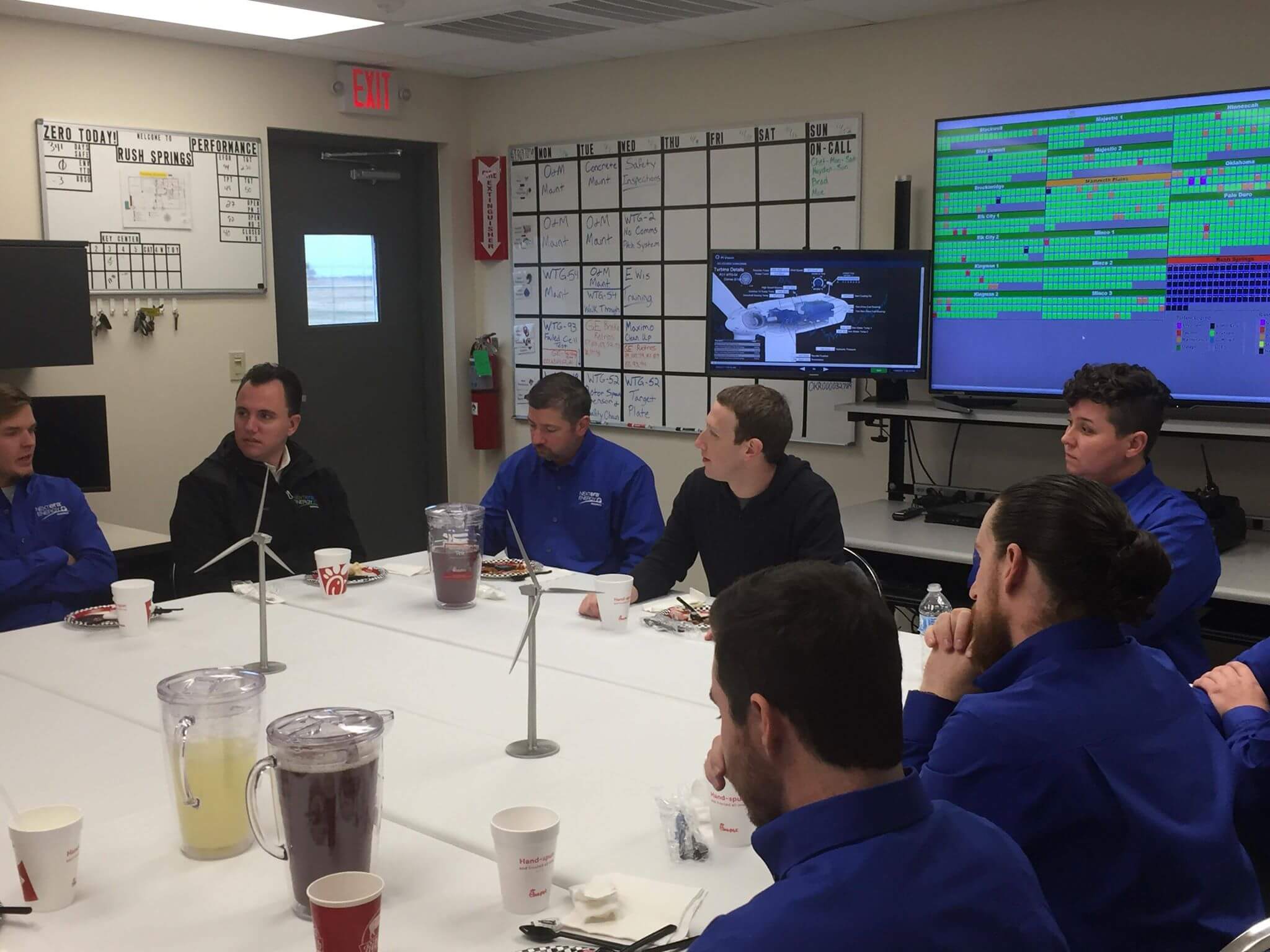
Nov. 8, 2017. (Provided)
(Update: This post was updated at 10:05 a.m. Thursday, Nov. 9, to include comments from Jim Roth.)









